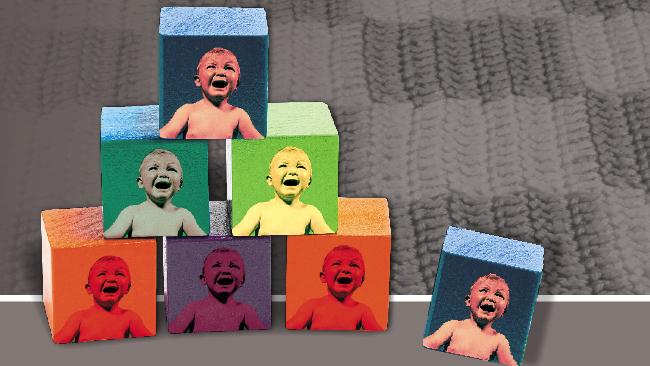Does your baby's name determine their success later in life?
JOE versus Dashiel. Kate versus Isabella. What does your child's name mean for their future?

JOE versus Dashiel. Kate versus Isabella. Deciding on a name for your baby is agonising and stressful, but what about the psychological impact of a name?
Do the more popular names guarantee your child will turn out normal and fit in with society, and the ones with quirky names mean they’ll stand out from the crowd and be rebellious? And does a child feel "safe” having the same name as three others in his class?
Here’s some research into the psychology of baby names.
 More: Use Kidspot's baby name finder
More: Use Kidspot's baby name finder
First impressions count
When we were choosing our first baby’s name, a friend gave us some wise advice: “Picture them walking into their first job interview, and with an outstretched hand they introduce themselves to their prospective boss,” she said.
That certainly got us thinking long and hard about the ‘right’ name for our baby! And so it should, says clinical psychologist Sally-Anne McCormack.
“Some odd and unusual names can be quite detrimental to a child, flowing through to their adult lives,” she says. “In the first instance, a name and the way you present yourself gives the initial image we give to people. After that, once people get to know someone, they will make up their own minds.
"But first impressions do seem to count: In a recent study of online dating, there were some individuals who were neglected by dating suitors because of the negative perception of their name. A name can have a big impact.
“A name is a hurdle you have to get past to know the person. If the hurdle’s too high, you are more likely to not bother with trying.”
Safety in numbers
There are three Williams in my son’s Year 2 class, and they’re known as ‘William S’, ‘William T’ and ‘William N’.
Their name, along with several others in this year’s most popular baby names list, has ranked highly for a good part of the last decade. And so it seems there are Williams, Lachlans, Chloes and Emmas everywhere.
“There are common names in an age group and an era in which someone is born,” says McCormack. “We tend to use names we hear. They become part of our common language and we like them and are comfortable with them.
“For some children, there’s a nice commonality about having the same name as others,” she says. They feel comfortable and are not held back by feelings of being an outsider.
“For others, they may think, ‘Well I’m just one of many and there’s nothing exciting about me. It’s possible they may feel a little bit lost in the crowd when they’re surrounded by people of the same name. Or they may feel part of a special group.”
Alternative and individualistic names
Okay, so how about the children of celebrities, with offbeat names such as Blue, Pax, Peaches Honeyblossom and Poppy Honey – how will they cope with their hurdles?
“There’s an old song about a baby boy named Sue,” says McCormack. “The theory is that by naming them Sue they would be tough and be able to fight. That theory can backfire.”
She says that a child with an offbeat name, such as a boy named Sue, may be continuously teased in school; which in turn damages their self-image and can then have lasting psychological effects.
By contrast, “William” named after a past and future king of England, may be empowered by his name being linked to royalty, and others might subconsciously respond to him with a certain level of respect.
“It’s cute to call a baby Poppit but it really is important to think further ahead,” says McCormack.
 More: Top 100 baby names
More: Top 100 baby names
How do you pronounce your name?
Dr Simon Laham of the University of Melbourne’s Psychological Sciences Academic Centre says, "names carry a lot of information.”
In a recent study in which he collaborated with researchers from New York University's Stern School of Business, he found that people with easy to pronounce names were more likable and more successful than those with hard to pronounce names.
“It’s due to a phenomenon known as processing fluency,” Dr Laham says. “If a name is easy to pronounce (such as Ben and Kate), it is judged as being more familiar, and more positive.”
A safe, easier to pronounce name may in fact prompt a child to excel in life, according to Dr Laham’s study with Dr Adam Alter from New York University.
In the study, the first and last names of 500 US lawyers were analysed and “it was found that those lawyers with the most pronounceable names were promoted faster than their unusually-named counterparts, even though they had comparable skills and experience,” says Dr Laham.
“Theoretically, first names like Ben, Paul, Kate and Sarah are more familiar than Chaya, Laia and Giovanna, (and) surnames that are easy to pronounce (e.g., Benson, Musonda, Pappas) should be perceived as more familiar than those that are hard to pronounce (e.g., Vougiouklakis, Leszczynska).”
A lasting impact
Despite the findings, McCormack says it’s difficult to pin a naming decision on the little research there is on the topic. “There are so many other things that influence success, and temperament: it really does depend on the personality of the child,” she says.
After all, we all can think of successful men named Graham as well as John, and little girls named Isabella who are more of a ‘tom boy’ than say a Jenny.
McCormack says the important thing to remember as you’re looking at baby names is that people do make judgments based on a name.
"Parents need to think about the impact and longevity of a name. I don’t mean you want to map their lives out for them, but consider your family values and think how you like them to be a valuable contributor to society. Names depict this.”
Dr Laham adds, “If I was naming my kid and wanted to give them all possible benefits, I’d think long and hard about the pronunciation of their name.”



